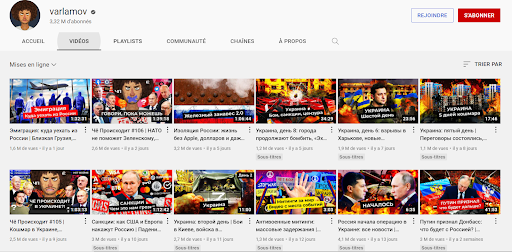The Russian government has blocked Facebook, Twitter and TikTok and passed a new media law that imposed a prison term of up to 15 years for intentionally spreading “fake news” about the country’s military. Our team spoke to Maya Volf, who works as a producer for Russian opposition YouTuber Ilya Varlamov about how they are working to get their messages out despite this censorship.
Maya Volf works as a producer for Russian YouTuber Ilya Varlamov who speaks openly about the war in Ukraine on his YouTube channel dedicated to analysing Russian politics. Volf is currently in Amsterdam, but she says part of her team is still in Russia. For security reasons, she couldn’t tell us where Ilya Varlamov is located.

Maya Volf spoke to the FRANCE 24 Observers:
On Twitter, a lot of people post things like "Russians, you can stop this war”. But no! Russians can’t. Even just getting information and sharing it with others is really dangerous for us and our families. For example, my husband is in Turkey right now because I am afraid for him.
TikTok, Twitter and Facebook have all been shut down in Russia. So how are those Russians opposed to the war supposed to get information? For now, we still have Instagram, Telegram and WhatsApp. YouTube is still working as well, but we think that both YouTube and Instagram are going to be shut down shortly, too. Soon, there will only be Telegram left.
We’ve built a 'new dictionary' to get around censorship
New laws in Russia mean that we can’t write what we want. We can no longer talk about the war, except for sharing information provided by the Russian ministry. Currently, journalism in Russia is dead because if we write, for example, about the death of Russian soldiers, we risk going to prison for 15 years.
It’s like we’ve had to create a new dictionary to get around this new media law.
We can no longer say the word “war”. Saying a phrase like “Glory to Ukraine” is considered extremism. Saying “Stop the war!” is also considered a form of extremism. So we have to talk about the war without using those words. So we mention the “situation in Ukraine” and “tanks” […], but we have our lawyers review every word.
If I take a look at our channel in Russia, I’ll see that the articles are written with strange words, but I understand why. As a journalist, I know that it’s a new dictionary that people are using to talk about the war in Ukraine. But there are a lot of other people who don’t know what’s happening. We know how to read through the lines, but how will other people understand what is happening in Ukraine?

Some Russian YouTubers and bloggers who are against the war use other forms of “coded” language to get around censorship. In an Instagram post from March 6, after the law against false information was passed, Youri Doud, a Russian YouTube star known for reporting on topics that aren’t covered by Russian state media, shared a song called “100-Year War.”
A band called Noise posted this song the day before the country was bombed by Russian troops. The song doesn’t directly mention the war in Ukraine, but, in the comments, the band wrote:
We’ve talked about […] what an artist should do when he has absolutely no way to influence the course of a social and political catastrophe that is unfolding. We came to the conclusion that all of us, the pathetic artistic intelligentsia, we are nothing more than the dandruff on the shoulders of a frightened general. And so we have no other choice than to honestly speak up about what is happening. So that’s what we are doing. PEACE.
Media law and blocks on social media mean Russian independent YouTubers have no way to speak out
Maya Volf continues:
We’ve been working for more than ten years in Russia but this is the most difficult period yet. We make money from YouTube, Google and through ads. And right now, because of the crisis, Google has stopped Russian users from being able to monetise their channels. YouTube is the most important channel for getting money. But we can’t register as a media outlet because of Russian censorship.
I understand why the international community has enacted sanctions but they are also extremely hurtful to the Russian opposition. And we have to endure that along with the impact of Russian government policies.
People are turning to VPNs and Tor to get around blocks
YouTubers Ilya Varlamov and Youri Doud suggest on their YouTube channels that people watch using a VPN, a technology that enables people to visit blocked websites by hiding their location.

VPN use in Russia has increased by more than 600% since the invasion of Ukraine, according to TOP10VPN, a site that tracks the use of this technology.

But even a VPN isn’t a miracle solution. Russians can’t pay for a VPN with Visas or Mastercards because of the recent sanctions and have to find a new way of paying.
On March 8, Twitter announced that it would be launching a service on Tor, a network that helps people get around the government’s internet blocks and navigate anonymously.







